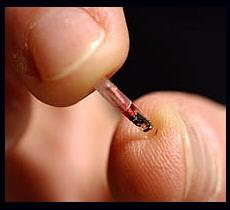The tin-foil hat contingent may have finally hit on something right.
rfid

No-Swipe Credit Card No Problem For Thieves
Radio-frequency enabled credit cards allow consumers to complete transactions with a flick of the wrist, but new research shows that it’s not just consumers and merchants who will find the new system easier.

RFIDs Cloned Within Human Flesh
If it means I have to memorize one less arbitrary pin code in my life, you can tattoo a bar code on my forehead as far as I’m concerned. Still, many are worried about the privacy issues involved in implanted RFID chips, and the prospect of living in a society that may make them mandatory. Big Brother and all that.

Ohio Employees Have a Chip On Their Forearm
Most people don’t mind wearing a security badge to work, but CityWatcher.com’s new employee identity verification system may be the first of its kind: RFID microchip implants. The Cincinnati-based video surveillance firm has “chipped” a couple of its employees, implanting glass-encased RFID transmitters in their forearms. The chips act much like current RFID badging technologies, granting the chipped employees access to restricted areas—the main difference seems to be that a determined thief would have to cut the chip out of the employee instead of simply making off with their badge. Makes the $10 badge replacement fee pale in comparison, we think.

